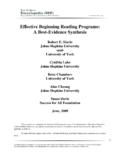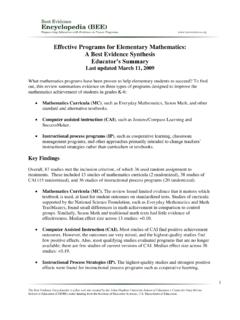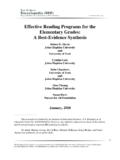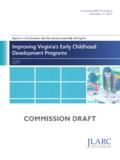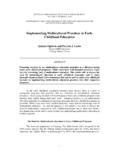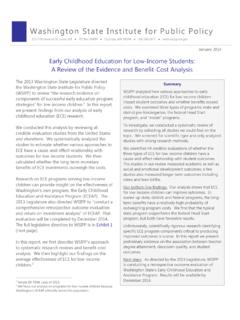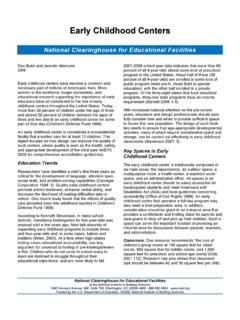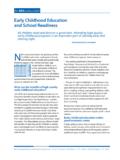Transcription of Effective Early Childhood Education Programs: A Systematic ...
1 Effective Early Childhood Education programs : A Systematic Review Bette Chambers University of York and Johns Hopkins University Alan Cheung Johns Hopkins University Robert E. Slavin University of York and Johns Hopkins University Dewi Smith Success for All Foundation Mary Laurenzano Johns Hopkins University September, 2010. _____. This research was funded by the CfBT Education Trust. However, any opinions expressed are those of the authors and do not necessarily represent CfBT positions or policies. Our appreciation goes to Diana Dugan, Susan Davis, and Michele Victor who also helped with locating and organizing the studies. 1. The Best Evidence Encyclopedia is a free web site created by the Johns Hopkins University School of Education 's Center for Data-Driven Reform in Education (CDDRE) under funding from the Institute of Education Sciences, Department of Education .
2 Abstract This report systematically reviews research on the outcomes of programs that teach young children in a group setting before they begin kindergarten. Study inclusion criteria included the use of randomized or matched control groups, evidence of initial equality, and study duration of at least 12 weeks. Studies included valid measures of language, literacy, phonological awareness, mathematical, and/or cognitive outcomes that were independent of the experimental treatments. A total of 38 studies evaluating 27 different programs met these criteria for outcomes assessed at the end of preschool and/or kindergarten. The review concludes that on academic outcomes at the end of preschool and/or kindergarten, six Early Childhood programs showed strong evidence of effectiveness and five had moderate evidence of effectiveness.
3 A few longitudinal studies have followed their subjects into secondary school, and even adulthood. These studies show that comprehensive programs focused broadly on cognitive development rather than solely academic skills had better long-term effects on social adjustment outcomes such as reductions in delinquency, welfare dependency, and teenage pregnancy, and increases in educational and employment levels. 2. The Best Evidence Encyclopedia is a free web site created by the Johns Hopkins University School of Education 's Center for Data-Driven Reform in Education (CDDRE) under funding from the Institute of Education Sciences, Department of Education . Effective Early Childhood Education programs : A Systematic Review The Education of young children who are at risk for school failure is widely recognized as an important factor in determining future school success.
4 Previous reviews of programs for children between the age of three and entry into kindergarten demonstrate that Early Childhood Education is a worthwhile investment (Barnett, Frede, Mosbasher, & Mohr, 1987; Reynolds, Temple, Robertson, & Mann, 2001). Various researchers have found that for each dollar spent on preschool, somewhere between four and eight dollars is saved in later social service costs to society (Barnett, 2007;. Karoly & Bigelow, 2005). In addition to short-term effects on academic achievement, long-term effects of several programs include fewer arrests, fewer teen pregnancies, and higher employment (Gilliam & Zigler, 2000). Recent brain research and research on cognitive development are reinforcing evidence that Early Education is crucial in getting children off to a good start in life (Bowman, Donovan, &.)
5 Burns, 2001; Magnuson, Meyers, Ruhm, & Waldfogel, 2003). Based in part on this research, local and national policymakers are establishing new Early Childhood programs , and trying to improve the quality of the ones that exist. While evaluations of Head Start and other Early Childhood programs in the and other countries have clearly shown positive effects of Early Education , in comparison to no services, the important question before researchers and policy makers today is what kind of preschool program is most Effective for young children? Which particular programs have positive outcomes and what elements of these programs contribute to their effectiveness? The present report reviews the evidence for the effectiveness of various preschool/nursery programs for young children who are at risk of school failure due to poverty.
6 It reviews the research on the outcomes of Early Childhood programs provided in a group setting for all children, applying consistent methodological standards to the research. The aim of this review is both to assist educators and policy makers in deciding on the types of programs to implement and to inform researchers about the current evidence on preschool programs and guide further research. The scope of the review includes all types of programs that principals or child care directors might consider adopting to prepare their children for success in elementary school and beyond. Previous Reviews Most previous reviews of preschool interventions have focused on the question of whether or not preschool attendance influences future school success ( , Currie, 2000; Gilliam & Zigler, 2000; Gorey, 2001; Karweit, 1993).
7 Some of these reviews carried out cost-benefit analyses of various forms of Early Education (Barnett, 1993; Penn et al. 2006). Only a few however, have made comparisons among different types of interventions (Barnett, 1995;. 3. The Best Evidence Encyclopedia is a free web site created by the Johns Hopkins University School of Education 's Center for Data-Driven Reform in Education (CDDRE) under funding from the Institute of Education Sciences, Department of Education . Chambers, Cheung, & Slavin, 2006; White, Taylor, & Moss, 1992). White's (1992) meta-analytic review concluded that Early intervention benefitted most children, but could not determine which types of interventions were most Effective . Barnett (1995) reviewed 36 studies of preschool attendance, Head Start, child care, and home visiting programs .
8 He concluded that Early Childhood interventions (compared to no preschool) generally have large short-term effects on intelligence measures and sizable effects on school achievement, grade retention, special Education placement, and social adjustment. However, he was not able to compare alternative preschool programs . Based on the Early reviews of long-term effects of preschool programs , new programs have been developed in recent years. Most of these new programs take a cognitive developmental perspective and combine elements of direct instruction for the whole class and small groups, along with times when children individually choose activities. There is usually a focus on developing children's language and emergent literacy. Many recent studies have evaluated these new programs , and often the experimental programs from past studies ( , High/Scope, Creative Curriculum) are now the control condition in recent studies.
9 The Chambers et al. (2006) review compared traditional, academic, and cognitive- developmental Early Childhood programs and found that academic programs generally produced better immediate and mid-term cognitive outcomes. However, cognitive-developmental programs produced better long-term educational and social adjustment outcomes. In addition to curriculum, another factor that differentiated programs was the degree of support that the teachers are provided in implementing the curriculum. Camilli and his colleagues (Camilli, Vargas, Ryan, & Barnett, 2009) conducted a meta- analysis of the effects of Early Education interventions on cognitive and social development. Using data from 123 studies, they included both studies that compared Early Childhood interventions to a no intervention group and those that compared alternative interventions.
10 Their conclusions echoed those of previous reviews in that they reported significant effects of attending a preschool program on social, school progress, and particularly cognitive outcomes but reported few differences in outcomes of alternative treatments. In a more focused meta-analysis of the effects of Early Childhood curricula on children's receptive and expressive vocabulary, Darrow (2009) evaluated 17 Early Childhood curricula. Drawing on data from 29 separate studies, Darrow concluded that Early Childhood curriculum interventions, taken together, did not differ from their respective control groups on vocabulary development by the end of preschool, nor at the end of kindergarten. However, she could not determine the impacts of particular programs . The UK Centre for Excellence and Outcomes (C4EO) (Coghlan et al.)



